The cost of clothing has major impacts on both the environment and household spending – with children’s clothing a particular problem. Children grow seven sizes in their first two years, and on an average, parents spend over £2,000 on clothing before their child reaches the age of three. But cost is just part of the problem: mass production of garments has huge consequences for the environment.Waste, water consumption and carbon emissions all place pressures on the environment.
Concerned about the lack of sustainability in the clothing industry, and frustrated by how quickly his two-year old niece outgrew the garments he had bought for her, Yasin set out to address the problem by employing some technology aspects which are not typically used in materials.
 While studying aeronautical engineering, Yasin focused his master thesis on deployable nano-satellites, understanding how to pack as much material into as small a space as possible. Craving tangibility and time away from the CAD screen, he decided to enrol on a two-year postgraduate course in global innovation design at the Royal College of Art. Yasin said: “I wanted to explore materials, and get my hands dirty at every opportunity.”
While studying aeronautical engineering, Yasin focused his master thesis on deployable nano-satellites, understanding how to pack as much material into as small a space as possible. Craving tangibility and time away from the CAD screen, he decided to enrol on a two-year postgraduate course in global innovation design at the Royal College of Art. Yasin said: “I wanted to explore materials, and get my hands dirty at every opportunity.”
He employed an origami-like technique from his work with nano-satellites into the design of Petit Pli by using the Negative Poisson’s ratio, which allows materials to expand in two directions at the same time. Known as auxetics, this phenomenon is more commonly utilised in stents and biomedical implants.
Yasin has captured these auxetic properties in Petit Pli through the use of pleating. The pleats deform in both directions, either folding together or expanding, and allowing the garment to move with the child. Heat treatment has fixed these properties permanently in place, even through the wash cycle.
Petit Pli also incorporates a hydrophobic coating making the garments waterproof. The grid-like folds on the outerwear point downward, so rain can easily run off. When it’s not in use, the jacket is small enough to fit in a parent’s pocket. And, in keeping with the environmental principles at the invention’s core, it is fully recyclable.
As national winner of the James Dyson Award, Ryan will receive £2,000 as well as moving on to the international round of the competition, for a chance to win £30,000.
Ryan said: “It’s an honour to have won the UK James Dyson Award, it’s just great to have that backing and recognition of my solution. In addition to supporting my R&D, the prize money will help me form an interdisciplinary team of experts to take Petit Pli to the next level: putting it in the hands of parents worldwide, and making a tangible difference to the way we consume resources in the fashion industry.”
Ryan’s next mission is to grow Petit Pli into a business. Already having conversations with distributors and manufacturers, he hopes to capture the interest of potential investors and continue to develop innovative garments where tech merges with textiles.











